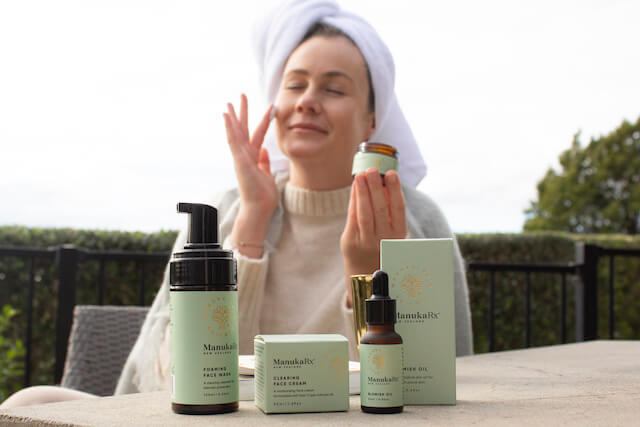Acne sometimes pops up when you least expect it.
Don't worry: Blemishes, pimples, blackheads, and clogged pores are absolutely treatable, and we're here to tell you how!
You can have clear skin, and you have the right to fight for it.
It's important to understand what causes this annoying and common embarrassing condition so you can select the best natural skincare for acne.
What Causes Acne?
Acne develops when hair follicles get blocked by debris on the surface of your skin like keratin and sebum. This debris builds up around the follicle and creates a dome. You're probably familiar with this dome as blackheads or whiteheads.
Several factors and conditions can contribute to the problem. Let's look at some of the most common causes of acne.
- Hormonal imbalance or reproductive disorders like polycystic ovary syndrome
- An overactive or underactive thyroid
- Chronically dry skin
- Over-exfoliating or disturbing the skin barrier
- Inflammation
- Diabetes, digestive problems, candida, or metabolism imbalances
- Acute or chronic stress
- Insomnia or long-term sleep deprivation
- A diet containing high levels of sodium, sugar, simple carbs, or cholesterol
- Overworked liver or kidneys
Why Conventional Acne Treatment Products Often Fall Short
For many people, conventional treatment options like salicylic acid, Accutane and many others can aggravate the skin and make acne worse.
The problem with these treatments is the same thing that makes them work --they're harsh. Although they may help many people with acne, they also:
- Strip the skin of vital natural oils
- Disturb or damage the skin's protective barrier
- Negatively interact with the sun or medications
- Leave skin dry and dull
- Lead to premature aging
As you can see, natural skincare for acne can help you avoid damaging your skin, stop triggering flareups, and deeply nourish the skin.
What You Should Know About Natural Skincare for Acne
Transitioning to natural skincare products is an excellent decision to make for your health. Here are a few things you should keep in mind before you rush out and buy a bunch of new products.
1. You Need to Understand Your Skin
Conventional skincare products usually have very direct labels persuading you to buy. They directly say "for dry skin", "for oily skin", "for acne" or "for anti-aging".
Natural skincare products often don't contain these same labels. Instead, they tend to highlight the key ingredients inside the bottle. As a result, it's important to understand what your skin needs.
Carrot seed oil is great for dry skin while jojoba or mānuka oil help fight bacteria.
2. Natural Skincare for Acne Is Food for Your Face
Your skin absorbs everything you put onto it. So, what are you feeding your skin?
Natural skincare products are made from plant-based ingredients which often contain essential vitamins and minerals like vitamin A (retinol), vitamin C, copper, and omega fatty acids.
3. Swap Salicylic Acid for Natural Bacteria-Fighting Ingredients

Nature provides plenty of antibacterial compounds which help clear acne while nourishing your skin.
Look for ingredients like:
- Mānuka oil
- Tea tree oil
- Jojoba oil
- Castor seed oil
- Honey
- Lavender
- Chamomile
- Frankincense
4. Labels and Certifications Aren't Everything
It's important to remember that the word "natural" often doesn't mean anything. Companies will slap this word onto products that aren't actually made from natural ingredients.
Likewise, if a product doesn't contain an "organic" or "non-GMO" certification, it doesn't necessarily mean the product isn't organic or non-GMO. Brands need to pay fees and go through inspection processes to use official certification labels. Instead, read ingredients.
5. You Can – and Should – Think Outside the Box
You can find plenty of natural skincare products for acne in the grocery section. Apple cider vinegar, honey, grapeseed oil, and yogurt can all help balance the skin's PH levels and reduce acne.
6. Keep an Eye Out for Allergens
Although toxins in conventional skincare products often trigger allergic reactions, natural products are not immune. If you have specific food allergies, read the ingredients.
Many natural ingredients are unique to skincare – you probably wouldn't eat them at any point. As a result, you may not realize you have an allergy to certain substances until you try it via natural skincare for acne products.
7. Oil ≠ Oily Skin

Oil nourishes and cleanses the skin. Not all oils will make your skin oily or clog pores. Oils like jojoba, carrot seed, castor seed, and essential oils are vital for skin health.
You Can Mix These Natural Ingredients Yourself
You can mix all these ingredients and experiment with quantities yourself, or you can try some of over the counter products that contain them.
ManukaRx have products to help cleanse the skin and prevent acne that are formulated using the best natural ingredients. See our Mānuka Essential Oil Blends that help fight different skin issues and take control today!






